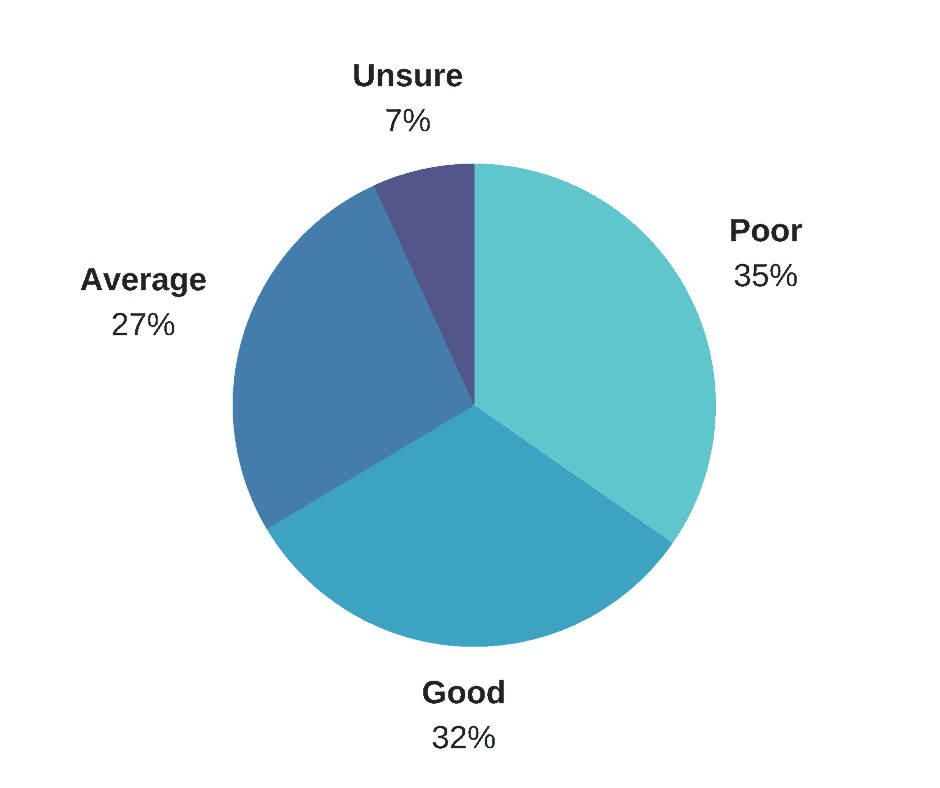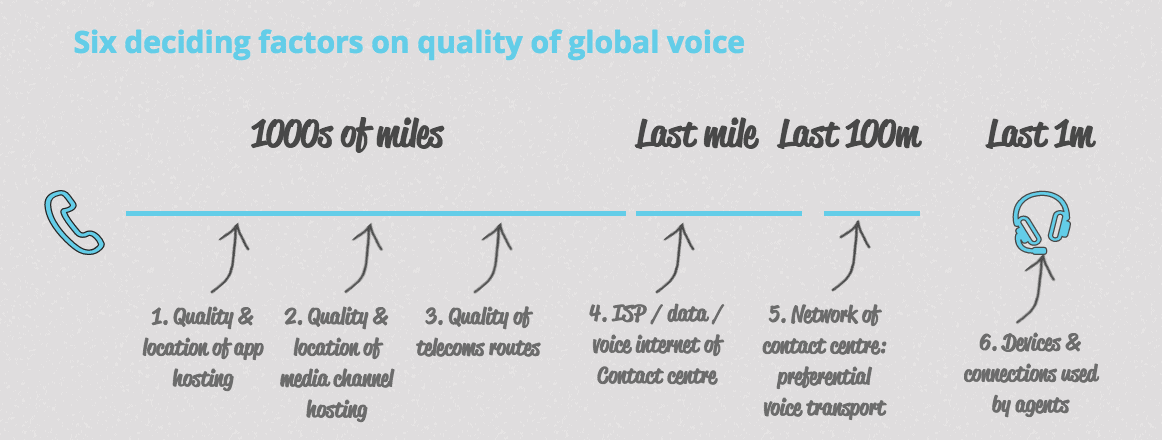Adopting cloud call center infrastructure should be straightforward. But, when a business chooses the wrong vendor, they can get trapped with a solution that limits call quality and flexibility.
So let’s look at the important questions you should address before deciding where, and how, to host your cloud call center.
Who is responsible for the call infrastructure?
A lot of businesses never ask this question – but it’s a big one.
It’s very common for cloud contact center vendors to construct their product over the top of another vendor’s infrastructure. And while that might make sense for the vendor, there are good reasons for you as the buyer to avoid this situation. The first is call quality and reliability.
Controlling the infrastructure is very important for guaranteeing good audio quality. Obviously, that’s an important consideration for any contact center, and in one survey of internet service providers, over a third of customers reported that call center audio quality was poor.
How would you rate the audio quality of your ISP’s call center?
They went on to report that low quality audio is among the biggest irritants, even ahead of the high cost of premium rate lines.
Good call quality does not happen on its own
You need to be able to get to the root of persistent audio problems quickly. That’s why you should only work with vendors that
a) have total control of the call infrastructure, because they built it, and
b) actually have the expertise to undertake network optimization.
Aside from aggravating customers, audio quality issues can also generate big expenses. Research from SIS International suggests that latency issues across a staff of just 100 people can generate additional costs of over half a million dollars per year.
So this is the big question to ask before making a purchase decision: if you notice some of them most typical problems – poor audio quality, or latency – is the vendor in a position to isolate the logs for agent devices and channels directly? Or do they need to reference a 3rd party infrastructure provider for the analysis?
The following diagram illustrates the aspects of an end-to-end call connectivity route that you need control over. You can read more about the underlying factors impacting call quality and reliability here.
What can you change?
Customisability is another major issue when vendors don’t run their own infrastructure. At babelforce, we’re very focused on the customisability of service that we can offer; it’s why we built our own underlying call infrastructure. It enables us (and our users) to adapt platform behaviours when needed.
But when a cloud contact center platform is just a ‘wrapper’ built over the top of a secondary service, users are very quickly going to hit a wall with what they can change. It’s like living in a rented house – you can hang up your own pictures, but you can’t change the wallpaper.
[bctt tweet=”“Voice is still the default option for over two thirds of interactions”” via=”no”]
If you want to have any say in how you use the infrastructure under your call platform, how are you going to achieve that? If the vendor’s infrastructure is really just an API to another API, you’re not going to be able to – end of story.
That’s why we recommend selecting a multi-carrier network that can provide some variety and choice in how you work. Because babelforce provides calls over 40 carriers and 300 suppliers, we can directly assign whatever phone numbers you need in any territory, no trouble.
Can you use any device? – Are you locked into telecoms carriers?
Lock-in to the vendors chosen devices, infrastructure and telecoms carriers is a serious issue. For anyone who has operated large scale contact teams in service or sales it will send a cold shiver down the spine.
The threat of lock-in is so significant for many businesses that 78% of IT executives believe lock-in fear has prevented their business from embracing cloud resources.
And it’s a reasonable concern. Even if a platform’s service is great now, limited network and carrier choice will sting you further down the line.
[bctt tweet=”“Even a minor latency issue over 100 agents can cost over half a million dollars per year” ” via=”no”]
You should also aim for choice in the kinds of devices that you deploy. Can you be device agnostic, able to use any standards-based phone? Or are you restricted to a built-in browser phone, or devices supplied by the vendor?
For babelforce, the ‘lock-in’ approach has always seemed incompatible with good relationships. In fact, we make sure it’s easy for our customers to leave if they need to. That way we can be sure that the service we offer really does meet our client’s needs – because if it didn’t, they wouldn’t still be doing business with us.
Is your data really that secure?
Security and data protection are at the forefront of contact center operations. When sensitive data is relayed during a phone conversation, you need to know that it does not continue to live on anywhere.
But, that’s another thing most vendors find impossible to promise. Again, it’s because their platforms only exist as an extra layer on a different infrastructure. Data packets can easily be stored without your knowledge (or permission), violating both in-house compliance and legal obligations.
Businesses that fail to comply with PCI DSS – and get caught – can cost a lot directly in fines. On top of that, they can stand to lose a lot of customer faith as data use becomes an ever more pressing issue for regular consumers.
Only a platform with complete control over its own infrastructure can absolutely guarantee that data packets are totally unrecoverable.
It’s useful to ask a vendor this as your first question. If they can’t commit to 100% data protection at this level, its might not be worth continuing the conversation.
A lot of great looking call center platforms are really just skin-deep wrappers. The differences with babelforce are:
-
- We control the underlying call infrastructure,
-
- We have direct relationships with carriers,
-
- We are network geeks, obsessed with quality.
To find out how to make your communications more dependable, and more secure, talk to us today.







